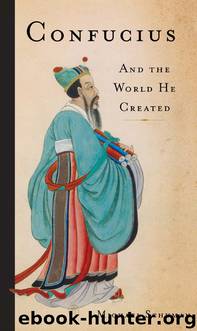Confucius by Schuman Michael

Author:Schuman, Michael [Schuman, Michael]
Language: eng
Format: epub
ISBN: 9780465040575
Publisher: Basic Books
CONFUCIUS PERSONALLY SET the standard for studiousness in East Asia. He took immense pride in his lifelong search for knowledge and considered his undying love of learning to be his most admirable trait. “In a hamlet of ten households, there are bound to be those who are my equal in doing their best for others and in being trustworthy in what they say,” he says in the Analects, “but they are unlikely to be as eager to learn as I am.” According to historian Sima Qian, Confucius read his copy of The Book of Changes so frequently that he wore out the tongs binding the bamboo-strip pages three times. To Confucius, learning, reading, and debating with his disciples were a great source of joy. “Quietly to store up knowledge in my mind, to learn without flagging, to teach without growing weary, these present me with no difficulties,” he once said.12
Confucius had probably learned a lot more than most people of his day. In antiquity, books were rare and cherished items, even in a society so devoted to writing as China, and Confucius probably had better access to works of history and poetry than most of his contemporaries. Nor did the average person in China during his day enjoy the luxury of time to sit around and read; there were farms to be plowed and mouths to feed. As a result, Confucius became well-known during his lifetime for his almost encyclopedic store of knowledge. The old histories reveal how people would seek him out with all sorts of obscure queries, and he was able to solve their riddles. On one occasion, a falcon fell dead, shot with an arrow, at the court of the duke of Chen, who asked Confucius about the strange incident. The master instantaneously identified the source of the weapon. “This falcon has come a long way,” he informed the duke. “The arrow belongs to the Jurchens,” a nomadic tribe from China’s northern frontier. How, exactly, did Confucius know this bit of trivia? The Jurchens, Confucius explained, had sent similar arrows—made of thorn with stone arrowheads—as tribute to an ancient king of China, Confucius recounted. The duke went into his own treasury, and sure enough, found the arrows stored there; they had been given to the court years before as a gift.13
Most of Confucius’s knowledge, however, was far more useful. He was highly regarded for his expertise in history, court ceremony, and the culture of Chinese antiquity. This knowledge made Confucius a popular teacher who spent long periods of his life as an educator. Fung Yu-lan, a twentieth-century Confucian thinker, concluded that Confucius may have been China’s first full-time teacher. He further speculated that the sage became the prototype of a class of scholars—the ru, or literati—who would come to play a critical role in Chinese history. “Confucius was the first man in China to make teaching his profession, and thus popularize culture and education,” Fung wrote. “It was also he who inaugurated, or at least developed, that
Download
This site does not store any files on its server. We only index and link to content provided by other sites. Please contact the content providers to delete copyright contents if any and email us, we'll remove relevant links or contents immediately.
| Military | Political |
| Presidents & Heads of State | Religious |
| Rich & Famous | Royalty |
| Social Activists |
Waking Up in Heaven: A True Story of Brokenness, Heaven, and Life Again by McVea Crystal & Tresniowski Alex(37811)
Empire of the Sikhs by Patwant Singh(23086)
We're Going to Need More Wine by Gabrielle Union(19046)
Hans Sturm: A Soldier's Odyssey on the Eastern Front by Gordon Williamson(18592)
Leonardo da Vinci by Walter Isaacson(13336)
The Radium Girls by Kate Moore(12028)
Tools of Titans by Timothy Ferriss(8396)
Educated by Tara Westover(8054)
How to Be a Bawse: A Guide to Conquering Life by Lilly Singh(7486)
Permanent Record by Edward Snowden(5847)
The Last Black Unicorn by Tiffany Haddish(5635)
The Rise and Fall of Senator Joe McCarthy by James Cross Giblin(5280)
Promise Me, Dad by Joe Biden(5153)
The Wind in My Hair by Masih Alinejad(5095)
A Higher Loyalty: Truth, Lies, and Leadership by James Comey(4964)
The Crown by Robert Lacey(4817)
The Iron Duke by The Iron Duke(4356)
Joan of Arc by Mary Gordon(4110)
Stalin by Stephen Kotkin(3966)
